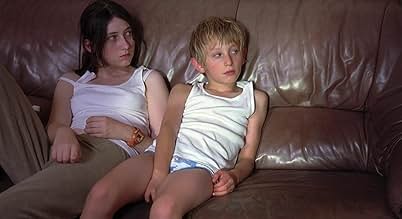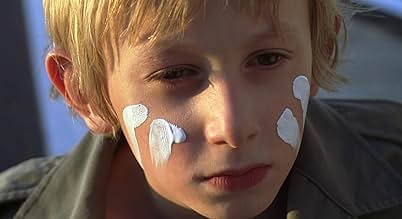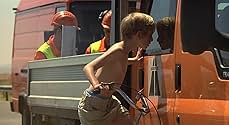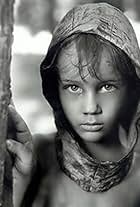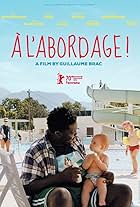IMDb RATING
6.9/10
5.1K
YOUR RATING
Life for an isolated rural family is upended when a major highway next to their property, constructed 10 years before but apparently abandoned, is finally opened.Life for an isolated rural family is upended when a major highway next to their property, constructed 10 years before but apparently abandoned, is finally opened.Life for an isolated rural family is upended when a major highway next to their property, constructed 10 years before but apparently abandoned, is finally opened.
- Awards
- 10 wins & 5 nominations total
Ivaylo Ivanov
- L'éboueur
- (as Ivailo Ivanov)
Marc Berman
- Radiotauroute
- (voice)
Featured reviews
Isabelle Huppert is a French mother of three, whose husband goes off to work in a big green diesel Mercedes estate. Their youngest is a boy, about 8. Then a girl, about 14, who's studious and questioning. Eldest is a late-teen daughter who wears as little as possible, chain-smokes and sunbathes in a bikini on a lounger in the garden, with heavy metal pounding from a ghetto-blaster.
This scenario and scene is featured and remains with us most of the time, in one form or another. Oh, except that their rather run-down shabby house sits right bang next to a motorway, that carries no traffic, except as the biggest car park imaginable for the family, who also use it as an extension to their property. They need to cross this bitumen desert to reach civilisation; work, shops and school for the kids.
One day, the boy sees trucks on the carriageway, whilst out on his bike. Soon after telling his father, who doesn't believe him, the motorway is resurfaced overnight. Radio reports say that it's the missing link in the national network and there's huge interest from the motoring public. The two youngest anticipate some new projects coming on.
What happens next is bizarre, believable and really rather frightening. And comical. By trying to live their (rather odd) lives exactly as before - crossing the road for school, shopping, bikini-sunbathing - all a few feet away from juggernauts and during a heatwave.
The way that the stakes against them get higher and naturally seem more bizarre, the more they try and carry on regardless, perhaps in the same way as if you tried to re-route an ant trail. Toward the end, you will start wondering where on earth all this can possibly lead to - I'm not going to spoil it for you!
I did think of one of Michael Haneke's early films when watching 'Home' that had this sort of 'in reverse' psychology, but which was decidedly cold, un-humorous - about a perfectly ordinary middle-class Austrian family, who coped - and then didn't.
You can, of course, take Swiss director Ursula Meier's fable as a comedy, or an environmental statement or a family drama, or all three. Being very different, it grabs the attention, without ever being ridiculous and somehow manages to sustain this element and story all the way through. It's also decidedly 'Continental', the bathing habits of the eldest daughter, naked and smoking in the bath listening to her Walkman, with the rest of the family chatting away next to her, mostly clothed. This - and other forms of a natural lack of inhibition seems healthy and refreshing, especially compared to our British straight- laced ways.
I give 9/10 as it's an ambitious film in both its audacity and originality and the fact that it gets away with it, becoming a sort of psychological horror. . .For a film to be so memorable is rare these days, although the title, unfortunately is. All the players, especially Huppert (naturally) are uniformly excellent and totally believable, as is their environment, which IS worrying....
This scenario and scene is featured and remains with us most of the time, in one form or another. Oh, except that their rather run-down shabby house sits right bang next to a motorway, that carries no traffic, except as the biggest car park imaginable for the family, who also use it as an extension to their property. They need to cross this bitumen desert to reach civilisation; work, shops and school for the kids.
One day, the boy sees trucks on the carriageway, whilst out on his bike. Soon after telling his father, who doesn't believe him, the motorway is resurfaced overnight. Radio reports say that it's the missing link in the national network and there's huge interest from the motoring public. The two youngest anticipate some new projects coming on.
What happens next is bizarre, believable and really rather frightening. And comical. By trying to live their (rather odd) lives exactly as before - crossing the road for school, shopping, bikini-sunbathing - all a few feet away from juggernauts and during a heatwave.
The way that the stakes against them get higher and naturally seem more bizarre, the more they try and carry on regardless, perhaps in the same way as if you tried to re-route an ant trail. Toward the end, you will start wondering where on earth all this can possibly lead to - I'm not going to spoil it for you!
I did think of one of Michael Haneke's early films when watching 'Home' that had this sort of 'in reverse' psychology, but which was decidedly cold, un-humorous - about a perfectly ordinary middle-class Austrian family, who coped - and then didn't.
You can, of course, take Swiss director Ursula Meier's fable as a comedy, or an environmental statement or a family drama, or all three. Being very different, it grabs the attention, without ever being ridiculous and somehow manages to sustain this element and story all the way through. It's also decidedly 'Continental', the bathing habits of the eldest daughter, naked and smoking in the bath listening to her Walkman, with the rest of the family chatting away next to her, mostly clothed. This - and other forms of a natural lack of inhibition seems healthy and refreshing, especially compared to our British straight- laced ways.
I give 9/10 as it's an ambitious film in both its audacity and originality and the fact that it gets away with it, becoming a sort of psychological horror. . .For a film to be so memorable is rare these days, although the title, unfortunately is. All the players, especially Huppert (naturally) are uniformly excellent and totally believable, as is their environment, which IS worrying....
Very interesting and surprising film starring one of my favorite actress, Isabelle Huppert. The film describes the changes that take place into an ordinary family who lives next to a highway.One day the highway is opened, and still life turns into a nightmare.Each member of the family deals with the problem in a different way. All of them try to keep on doing the same things in their own way, but things go wronger day by day.The cast play such excellent roles that you can feel the anxiety as they do.I was asking myself during the film Why don't they leave ? But there are no answers, only questions. Enjoy the film and try to find why.
Have you ever found yourself wondering about those people who live right alongside the freeway - the anonymous folk whose lives we peer into briefly as we hurtle our way past their apartments and houses en route to our destinations? Well, the artists who made "Home" certainly have, and the answer they've come up with makes for a fascinating, one-of-a-kind cinematic experience that, even more than most movies, has to be seen to be appreciated.
The family in "Home" leads a relatively carefree and decidedly unconventional lifestyle. Their house stands adjacent to an abandoned freeway, which they use as their own private recreation area. They also view bath time as a communal experience (this being Switzerland and all).
All is going reasonably well (despite some mild familial tension here and there), until one day and without any warning, the roadway is reopened to traffic, shattering the family's once-peaceful existence with the sounds of whooshing cars and honking horns, the penetrating odor of exhaust fumes and fossil fuels, a diminution of privacy (especially during traffic jams), and a nonstop assault on the senses. Even getting to the other side of the road – to school or to work – becomes a daily, death-defying game of chicken with speeding vehicles whose drivers have no intention of slowing down for bothersome and unwelcome pedestrians.
This tremendously odd little film is obviously intended as a parable about the oppressiveness and chaos of modern life as it encroaches ever more forcefully onto the peace and tranquility of a rural existence. The family members become increasingly ill-tempered, paranoid, neurotic, even violent as the outside world inexorably presses its way into their once-placid lives.
But far more than the characters and themes, it is the astonishing mise-en-scene that ultimately works its way into the viewer's psyche and that makes it hard not only to avert one's eyes during the course of the movie but to get back to one's own "reality" once it's over. Director Ursula Meier's work here is reminiscent of Luis Bunuel in one of his less playful moods, as she focuses on a group of everyday people trapped in a surrealistic nightmare from which they are unable to awaken. It is definitely a case in which the scene becomes an integral reflection of the psychological states of the characters.
Isabelle Hupert and Olivier Gourmet play the parents; Madeleine Budd and Kacey Mottet Klein their two children; and Adelaide Leroux, Gourmet's nubile daughter from a previous marriage who spends most of her time sunbathing for the highly appreciative motorists and truckers who keep whizzing on by.
Unique and unforgettable.
The family in "Home" leads a relatively carefree and decidedly unconventional lifestyle. Their house stands adjacent to an abandoned freeway, which they use as their own private recreation area. They also view bath time as a communal experience (this being Switzerland and all).
All is going reasonably well (despite some mild familial tension here and there), until one day and without any warning, the roadway is reopened to traffic, shattering the family's once-peaceful existence with the sounds of whooshing cars and honking horns, the penetrating odor of exhaust fumes and fossil fuels, a diminution of privacy (especially during traffic jams), and a nonstop assault on the senses. Even getting to the other side of the road – to school or to work – becomes a daily, death-defying game of chicken with speeding vehicles whose drivers have no intention of slowing down for bothersome and unwelcome pedestrians.
This tremendously odd little film is obviously intended as a parable about the oppressiveness and chaos of modern life as it encroaches ever more forcefully onto the peace and tranquility of a rural existence. The family members become increasingly ill-tempered, paranoid, neurotic, even violent as the outside world inexorably presses its way into their once-placid lives.
But far more than the characters and themes, it is the astonishing mise-en-scene that ultimately works its way into the viewer's psyche and that makes it hard not only to avert one's eyes during the course of the movie but to get back to one's own "reality" once it's over. Director Ursula Meier's work here is reminiscent of Luis Bunuel in one of his less playful moods, as she focuses on a group of everyday people trapped in a surrealistic nightmare from which they are unable to awaken. It is definitely a case in which the scene becomes an integral reflection of the psychological states of the characters.
Isabelle Hupert and Olivier Gourmet play the parents; Madeleine Budd and Kacey Mottet Klein their two children; and Adelaide Leroux, Gourmet's nubile daughter from a previous marriage who spends most of her time sunbathing for the highly appreciative motorists and truckers who keep whizzing on by.
Unique and unforgettable.
The World Health Organisation reckons regular night-time noise of more than 45dB can ruin your health. Here's a film that treats a fact of modern life and turns into a "home under attack" movie. It's coming, and you can't stop it.... It's quite clever to have a home-invasion movie where the alien force is nothing more scary than noise and loss of privacy.
Swiss writer-director Ursula Meier backs this tale of modern times with jazz tracks, classical work, and Nina Simone. The music is a diversion from the relentless pressure building on the family as they face up to life next to a Trans-European highway.
Cinematographer Agnès Godard captures the images brilliantly, from the pose Michel strikes on his car roof with the chest freezer that now has to be delivered across the new road, to the line of holiday traffic stretching into the distance in one long bidirectional jam.
Swiss writer-director Ursula Meier backs this tale of modern times with jazz tracks, classical work, and Nina Simone. The music is a diversion from the relentless pressure building on the family as they face up to life next to a Trans-European highway.
Cinematographer Agnès Godard captures the images brilliantly, from the pose Michel strikes on his car roof with the chest freezer that now has to be delivered across the new road, to the line of holiday traffic stretching into the distance in one long bidirectional jam.
Great insight in EU way of working, the years it takes to built a highway. BUT In the comments i see the movie maker made 1 error: international viewers mostly do not know the way we work in the EU in such cases. If a road, like in this movie, is built, many laws are applicable and even more ways to protest to hold the work up may result in a delay for years. If not all '1000 and one' permits are met, the work has to stop, especially when in the middle of protected nature nearby living area's. The people are no squatters, it is their family home, the children where born there. The parable is great, to be cut off from your existence as you know it, even after years of getting 'warm to the fact this will happen'. This is 1 apart movie, not great, but not small to. Well played, good actors and casting. Different story, deeper meanings in that story. Eight stars ! (I like fast paced movies, ad this is not as fast as the newly built highway which has a big role in it)
Storyline
Did you know
- TriviaUrsula Meier has been searching for location for nearly one year, even in Canada. Eventually she found a lost part of a highway in Bulgaria. The house in which the movie plays, was built alongside the highway especially for filming. There were up to 300 drivers "playing" the fast moving cars - all were inhabitants of a nearby village. On days without shooting the drivers came visiting the location with their whole families.
- GoofsAn accident halts the traffic on both sides of the highway. Only one side should be affected: the one leading to where the accident took place.
- ConnectionsFeatured in Women Make Film: A New Road Movie Through Cinema (2018)
- How long is Home?Powered by Alexa
Details
Box office
- Gross US & Canada
- $15,925
- Opening weekend US & Canada
- $1,403
- Dec 6, 2009
- Gross worldwide
- $2,186,716
- Runtime1 hour 38 minutes
- Color
- Sound mix
- Aspect ratio
- 1.85 : 1
Contribute to this page
Suggest an edit or add missing content







